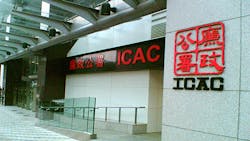China Continues Price-Fixing Probe, Fines Japanese Auto Parts Firms $200 Million
SHANGHAI -- China has fined 10 Japanese auto parts firms more than $200 million in total for price-fixing, authorities said Wednesday, reportedly the biggest-ever such penalties, in the latest step of the country's anti-monopoly drive.
Beijing has over the past year launched a wide-ranging crackdown on alleged malpractice by foreign firms across diverse sectors, including pharmaceuticals, baby formula and technology, raising fears overseas companies are being targeted.
The auto parts companies were found to have implemented monopoly pricing agreements for more than 10 years, the National Development and Reform Commission (NDRC) regulator said in a statement.
It fined them a total of 1.24 billion yuan (US$201 million), in what state broadcaster CCTV said was the biggest fine China had imposed since its anti-monopoly law took effect in 2008.
"The companies... unlawfully affected prices of auto parts, finished vehicles and bearings in China and harmed the interests of downstream manufacturers and consumers," the NDRC statement said.
Sumitomo Electric was fined the most -- 290.4 million yuan -- of the seven car parts firms penalised for fixing auto parts prices between January 2000 and February 2010, according to the statement, the others being Denso, Aisan, Mitsubishi Electric, Mitsuba, Yazaki and Furukawa Electric.
NSK, JTEKT and NTN were fined for price collusion over bearings between 2000 and June 2011, the NDRC added, with NSK ordered to pay 174.9 million yuan.
Two other companies, Hitachi Auto Parts and Nachi, which makes roller bearings, were found culpable but exempted from the penalties for taking the initiative to inform authorities and providing evidence on the monopoly agreements.
Five of the Japanese auto companies -- Mitsubishi, Denso, Sumitomo, NSK and JTEKT -- issued statements confirming the penalties and pledging compliance with Chinese law and regulations.
Mitsubishi Electric said it "takes this matter very seriously" and "will comply with the order."
Denso said it was its policy "to comply with all applicable antimonopoly laws."
Both NSK and JTEKT said they took the situation with "utmost seriousness" while Sumitomo said its "highest priority" was to comply with competition laws.
- Amanda Wang, AFP
Copyright Agence France-Presse, 2014
About the Author
Agence France-Presse
Copyright Agence France-Presse, 2002-2025. AFP text, photos, graphics and logos shall not be reproduced, published, broadcast, rewritten for broadcast or publication or redistributed directly or indirectly in any medium. AFP shall not be held liable for any delays, inaccuracies, errors or omissions in any AFP content, or for any actions taken in consequence.
